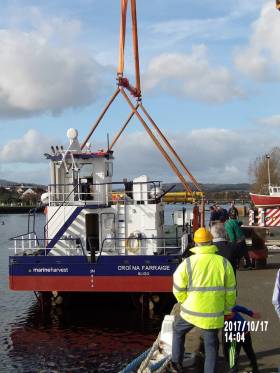Displaying items by tag: Salmon harvesting workboat
New 'Heart of the Sea' Salmon Harvesting Work-Boat Takes to the Water
#Newbuild - A mobile crane has lowered a new workboat into the River Avoca in Arklow this week for Ireland's largest producer of farmed Atlantic salmon, writes Jehan Ashmore.
The newbuild constructed by Arklow Marine Services is the Croi na Farraige (Heart of the Sea), a 17.5m salmon farm harvesting vessel for clients Marine Harvest Ireland. Staff from the company were invited to name the new vessel though a competition.
Croi na Farraige was transferred from the AMS building hall to the nearby North Quay of the Co. Wicklow port. It was from the quayside that the flat bottomed hull craft first made contact with the water.
The newbuild is equipped with a hydraulic crane mounted on the bow and a deckhouse is located aft. It is from the stern that can be seen in the above photo that the vessel has a twin rudder and propellor arrangement. Also clearly to be seen is that the vessel's port of registry is Sligo.
Marine Harvest have several sea farms along the western seaboard. They are located on Lough Swilly, Mulroy Bay, Inver Bay, Clew Bay, Kenmare Bay and Bantry Bay. All of the fish from these farms are packed at the firms Co. Donegal factory in Rinmore on the Fanad peninsula.
Croi na Farraige, will be used to support those sea-farms in Donegal waters from where Marine Harvest was founded by Irish investors in 1979.
MHI is part of the Marine Harvest Group with heaquarters in Norway, and is one of the world's leading seafood companies and the world's largest producer of Atlantic salmon. The global aquaculture operation employs 12,500 throughout 24 countries and servicing 70 markets.
























































